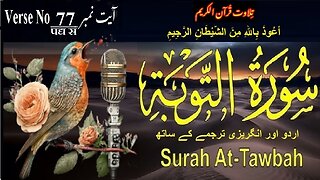Premium Only Content

Aisha Abdul Rahman and her shrine عائشہ عبدالرحمٰن کی سوانح عمری اور ان کے مزار کی تاریخ
@islamichistory813 #aishaabdalrahman #sufisaint #cultural #heritage #biography #islamic #mysticism #islamic #philosophy #shrine #historical #figures
Biography of Aisha Abd al-Rahman and the history of his shrine
Dekhti Aankhooon aur sountay kaanoon ko Asslamoalaikum, sisters, brothers friends and elders, in informative series videos of Islamic Women ascolars, sufisaints, cultural heritages, islamic philosophys, islamic mysticisms and historical women figures. today we are describing biography of Aisha Abd al-Rahman and the history of his shrine.
Aisha Abd al-Rahman (November 1913 – 1 December 1998), widely recognized by her pen name Bint al-Shati (Daughter of the Nile), was one of the most prominent figures in modern Egyptian literature and a pioneering Islamic scholar. Her literary and scholarly contributions, particularly in the fields of literature, history, and Islamic thought, have left an indelible mark on the cultural landscape of Egypt and the Arab world. Aisha Abd al-Rahman was born in November 1913 in the vibrant city of Alexandria, Egypt, which at the time was a melting pot of diverse intellectual, cultural, and political ideas. She grew up during a period of profound social and political change in Egypt, a time when national identity, cultural heritage, and women's rights were hotly debated subjects.
Aisha's education and intellectual development were greatly influenced by her father's position as a teacher and scholar, who instilled in her a deep appreciation for Arabic literature, Islamic theology, and classical texts. From an early age, Aisha showed an extraordinary aptitude for learning, especially in the fields of literature and language. She completed her studies at the University of Cairo, where she earned a degree in literature, becoming one of the first women in Egypt to pursue higher education in such fields. Her scholarly interests spanned many areas, including Arabic literature, history, and Islamic thought, but she is most renowned for her deep engagement with Islamic intellectual history and her ability to bridge classical Islamic scholarship with contemporary literary critique.
Aisha Abd al-Rahman’s career as a writer and intellectual took flight in the 1940s, when she adopted the pen name Bint al-Sha?i? — which translates to "Daughter of the Nile" — a symbolic reference to the Nile River, which has long been the lifeblood of Egyptian civilization. Under this name, she published numerous works, including critical essays, literary reviews, and historical studies. Her writing was deeply influenced by both her Islamic faith and her commitment to preserving the rich cultural heritage of Egypt and the Arab world. Her works often focused on the intersection of Islamic principles with modernity, and she was particularly interested in exploring the role of women in Islamic society.
Aisha’s contributions as an editor and professor of literature were equally notable. She spent a significant part of her career as a professor at Cairo University, where she taught Arabic literature and mentored generations of students. Her teaching style was engaging, and she emphasized the importance of both classical Islamic thought and modern literary criticism. She was passionate about creating a space for women in academic and intellectual circles and was an ardent advocate for women’s rights, particularly in the fields of education and intellectual participation. Aisha's scholarly work also included her critical engagement with the works of many famous Arab and Islamic authors, and she was known for her ability to navigate between traditional and modern perspectives in literature.
One of Aisha Abd al-Rahman’s most enduring contributions was her role in the reinterpretation of Islamic history and philosophy through a literary lens. She advocated for a more inclusive understanding of Islamic history, which recognized the contributions of both men and women in shaping the intellectual and cultural fabric of the Islamic world. Her work encouraged many to reexamine the role of women in classical Islamic thought and to recognize the importance of their voices in both the historical narrative and contemporary discourse.
Throughout her life, Aisha was not only a respected scholar but also a highly influential public intellectual. Her works often addressed issues that were central to the intellectual and political climate of her time, including national identity, social justice, and the place of Islam in the modern world. She was a vocal advocate for the importance of education, particularly for women, and worked tirelessly to challenge societal norms that restricted women’s roles in the public and intellectual spheres.
Aisha Abd al-Rahman passed away on 1 December 1998, leaving behind a vast legacy of written works and scholarly contributions. Her death marked the loss of one of the leading intellectuals of her generation, but her influence continues to resonate through her books, lectures, and the generations of students she mentored. She died in Cairo, Egypt, a city that had been the heart of her intellectual pursuits for much of her life.
While Aisha Abd al-Rahman did not have a grand mausoleum or a large shrine in the traditional sense, her legacy is honored in a number of different ways. Her contributions to Egyptian and Arab literature, as well as her significant role in promoting women’s education and intellectual engagement in the Arab world, have earned her lasting recognition. Her work continues to be studied in universities around the Arab world and beyond. Many institutions, including the University of Cairo, continue to hold her memory in high regard, celebrating her life’s work and the intellectual spaces she helped to open for future generations of women scholars.
Her grave, located in Cairo, has become a site of reverence for those who admire her contributions to Islamic scholarship and literature. Although there is no formal shrine built for her, the respect and recognition she commands in academic and literary circles serve as a living tribute to her legacy. Aisha Abd al-Rahman remains a symbol of intellectual independence, and her life's work continues to inspire scholars, particularly women, who are engaged in the fields of literature, Islamic studies, and gender equality.
With this, we ask for your permission until tomorrow, and tomorrow we will be described biography of Zaynab al-Ghazali and history of her shrine, at the end we pray to Allah Almighty to grant us the abilitty to act on the Quran and Hadith, Amen
Allah Hafiz
=============================
-
 1:23
1:23
ISLAMIC HISTORY
3 hours agoSurah At Taubah Verse No 77 تلاوت َسورة اَلتَّوْبَة اردو اور انگریزی ترجمے کے ساتھ آیت نمبر
1 -
 1:46:41
1:46:41
Man in America
9 hours agoLIVE: Assassin Story DOESN'T ADD UP! What Are They HIDING From Us?? | LET'S TALK
46.3K30 -
 2:24:17
2:24:17
Barry Cunningham
5 hours agoFOR PRESIDENT TRUMP WILL TAKE NO PRISONERS AND THE LIBS SHOULD EXPECT NO MERCY!
85.5K57 -
 1:08:41
1:08:41
Savanah Hernandez
5 hours agoCharlie Kirk Was Our Bridge And The Left Burned It
42.3K38 -
 1:59:01
1:59:01
Flyover Conservatives
8 hours agoFinancial Web Behind Charlie Kirk's Murder with Mel K | Silver On It's Way to $50 | FOC Show
55.4K3 -
 2:36:19
2:36:19
We Like Shooting
16 hours ago $1.01 earnedWe Like Shooting 628 (Gun Podcast)
37.3K -
 1:09:26
1:09:26
Glenn Greenwald
7 hours agoTrump's Shifting Immigration and H-1B Policies: With Journalist Lee Fang and Political Science Professor Ron Hira | SYSTEM UPDATE #515
170K36 -
 13:09:23
13:09:23
LFA TV
1 day agoLFA TV ALL DAY STREAM - MONDAY 9/15/25
258K61 -
 54:12
54:12
Donald Trump Jr.
6 hours agoCharlie's Vision. Our Future. | TRIGGERED Ep274
202K123 -
 1:03:35
1:03:35
BonginoReport
8 hours agoKirk’s Alleged Killer Dating Hateful Transgender??? - Nightly Scroll w/ Hayley Caronia (Ep.134)
129K150